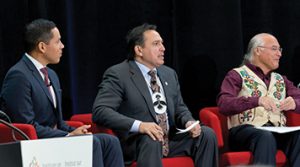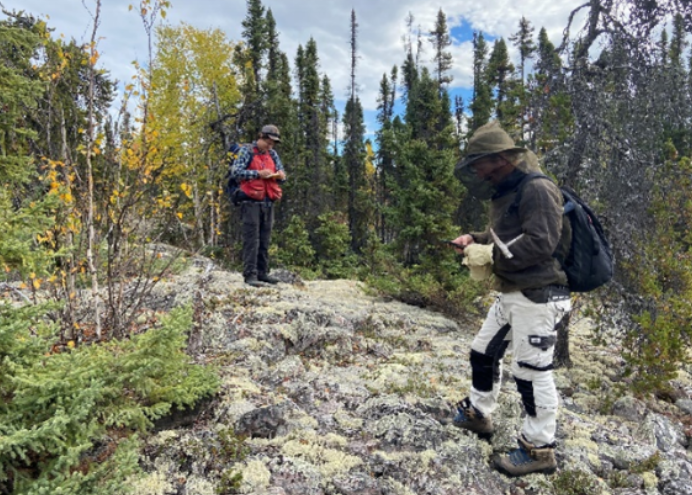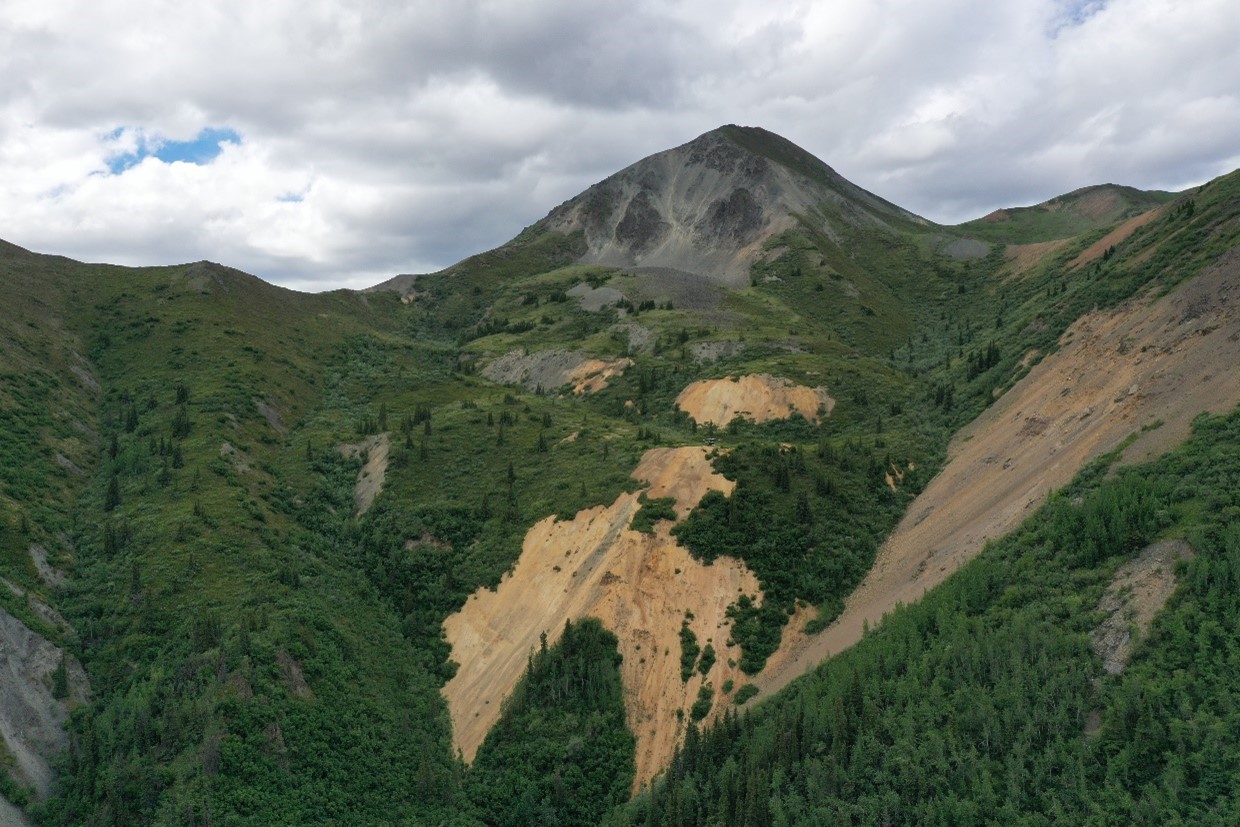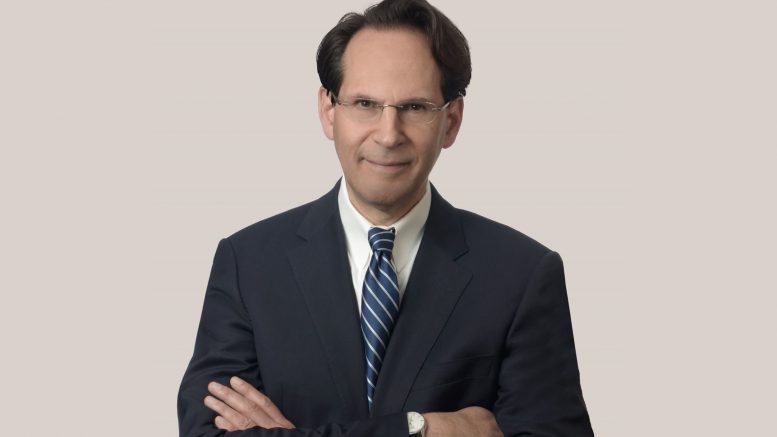Nation-to-Nation: Federal commitment to Indigenous people ushers in change

Natan Obed, Chief Perry Bellegard and Clement Chartier discuss the Indigenous perspective. Credit: Tania Budgell
The Canadian government has met several times with Indigenous leaders in the past year to establish what it calls a Nation-to-Nation dialog aimed at closing the gap between our First Nations, Inuit and Metis and the socio-economic benefits of the Twenty-first Century enjoyed by other Canadians.
What do Canada’s Indigenous people want? The same rights enjoyed by the rest of Canada: control over land ownership, their government and laws, their languages, the education and well-being of their children, and the opportunity to participate in the resource economies.
The process of reaching those goals may be complicated, but it begins with genuine respect for our Aboriginal population.
Respect was evident at the Nation-to-Nation meeting in Ottawa at the end of November. Delegates listened to chiefs from across Canada, politicians, former Prime Ministers, businessmen, and activist youth. Their views may have differed slightly on the details, but to a person they are committed to closing the socio-economic gaps that have arisen over the past 150 years.
CMJ is taking a look at the main themes addressed and how change will take place.
A proud history, a shameful failing
Native Canadians have a long and proud history – far longer than the 500 years that Europeans have trod the land. Indigenous culture is anchored in an oral tradition that addresses all aspects of creation, life and death. Their view of the world is no less valid than a European religious one.
“We want to share our stories, our culture,” said Natan Obed, president of Inuit Tapiriit Kantami. “Then we can respect each other in a new and complete way. We want to build this country with you. There is a place for all of us.”
The earliest treaties were based on sharing the land and its resources, and many in the native community would like to see a return to those values. The First Nations were marginalized by the Indian Act of 1876, or as Chief Wayne Christian of the Shuswap Nation Tribal Council called it “the most racist piece of legislation in the world. It’s crap.”
Native peoples have endured the extinguishment of their rights, and the kidnapping – if that is not too strong a word – of their children who were forced into residential schools where they were abused and their languages forbidden.
Notably, the Indian Act does not cover the Inuit and Metis or the First Nations in regions that were not yet part of Canada, i.e. British Columbia.
Nor have their rights been restored by the British North America Act of 1931, or the Constitution Act of 1982, the Charter or Rights and Freedoms, or the Meech Lake and Charlottetown accords.
Thanks in part to the Truth and Reconciliation Commission (TRC), we are all on a healing journey said National Chief Perry Bellegarde. It may not be perfect, but most Indigenous people see its recommendations as signposts to a better way forward.
Treaties must not be considered as final, but as living documents that change as the world changes yet honour their underlying principles.
Self-determination not optional
The bottom line for Indigenous peoples is self-determination. They want to be participants, not recipients. This desire underpins so many Indigenous court cases that demand this right. And the Aboriginal arguments are most often the winning arguments.
Before that happens, native Canadians will have to define their own nationhood.
As things stand now, there are three “nations” – Inuit, Metis and First Nations.
That definition is too narrow. It might be too broad if every one of the 600+ bands is a separate nation. Or the definition might be somewhere in between, but it is a question that can only be solved by the Indigenous community. No interference from outside is appropriate.
Amazingly, for all the harm European colonization has done to the native North American population, they remain firm in their determination to share the wealth.
This sentiment was expressed repeatedly and sincerely. The mining industry would do well to accept the Indigenous desire to be partners in the resource sector.
A new fiscal relationship needed
Establishing self-determination will take money – a great deal of money. This calls for a new fiscal relationship with the current government, and it must be created if a true Nation-to-Nation rapport is to be built. By off-loading the responsibility for health, education, housing and social welfare onto the provinces, the federal government opened the door to chronic underfunding of all these important programs.
This is a responsibility some would like the federal government to take back.
“If the Charlottetown Accord had have been closed by now,” said Isadore Day, Assembly of First Nations (AFN) Ontario Regional Chief. He reminded his listeners that equalization payments are not available to Indigenous people as they are to the provinces and territories.
Perhaps they should be.
“Indigenous lives can no longer be treated as a line item in a budget,” he declared.
Indigenous people know that each community needs a dependable revenue stream. Ideally revenue would flow from being equal partners in resource development and economic participation. Otherwise, or perhaps for an interim period, money would have to be provided from the federal coffers.
Or shared by the federal and provincial governments. In the words of former Ontario Premier and federal Cabinet Minister Bob Rae, “There has to be a multi-billion-dollar commitment from both the feds and provinces.”
Rights must be enshrined in law
It is generally acknowledged that the rights of Indigenous people must be enshrined in law. The Trudeau government has said it wants to make sure whatever law covers those rights cannot be overturned should the Liberals lose control of Parliament. They have even floated the idea of the Royal Proclamation to enshrine those rights.
Many Indigenous leaders insist that Indigenous peoples be recognized as founders of this country, equal to the French and English.
Former AFN National Chief Ovide Mercredi believes a constitutional mandate is needed to entrench Indigenous rights, “or the mistakes of the last 150 years will be repeated.”
He also had words for Justin Trudeau: “I say to the current Prime Minister finish what your father started.”
Celeste Haldane, chief commissioner of the B.C. Treaty Commission, wants to see the recommendations of the TRC put into actions now. “The TRC actions don’t need to wait for a new Royal Proclamation.
Do provinces have a role?
Whether or not provinces and territories have a role in negotiating self-determination for Indigenous nations is debatable.
Most native leaders want to see sole responsibility rest with the federal government. It was with them that all treaties have been negotiated, then broken.
And dealing with a single administration would be preferable to adding another 13 seats to the table. Those same leaders acknowledge that federal and provincial- territorial interests do not often align.
Nor can Indigenous self-determination be put to a referendum. As an example, the leaders point toward the failed Meech Lake Accord that was quashed when Manitoba and Newfoundland refused to ratify the document.
Most often it is the non-Indigenous segment of society that expresses an interest in having the provinces at the table. One of the strongest proponents is former Ontario Premier and federal Cabinet Minister Bob Rae. He expects both the federal and provincial governments to support Indigenous self-determination by supplying the not inconsiderable billions of dollars it will take to bring about real change.
Former Chief Justice of the Supreme Court Frank Iacobucci also favours including the provinces in negotiations.
He believes it would be possible to make a federal-provincial proclamation on Indigenous rights and skip the “royal” aspect. “But that’s just my personal opinion,” he added.
“Including the provinces is a recipe for disaster,” said Manitoba Senator and chief commissioner of the TRC Murray Sinclair. “Let the feds consult with the provinces and the Indigenous community with the federal government. This is about righting a relationship we want to keep.”
The way forward
So much Euro-centric lawmaking has left the relationship between the Government of Canada and its Indigenous peoples at a tipping point. Whether that relationship teeters along, races forward with a new sense of equality, or slides backwards to make again the mistakes of the past 150 years remains to be seen.
The Minister of Indigenous Relations and Northern Affairs Carolyn Bennett told the Nation-to-Nation gathering that Indigenous peoples have the support of the Liberal government. She pledged to assist the Inuit with their land claims, support the Metis population, and get the First Nations out from under the Indian Act. There is much to do to close the socio-economic gap that exists between natives and the rest of the country.
As Bob Rae added, “We have underestimated the size of the challenge before us and the length of the journey.”
But the Liberal government remains determined to make amends rather than merely apologize. “We have talked for too long,” said Hon. Jane Philpott, Minister of Indigenous Services. “Let’s be the people who get things done!”





Comments